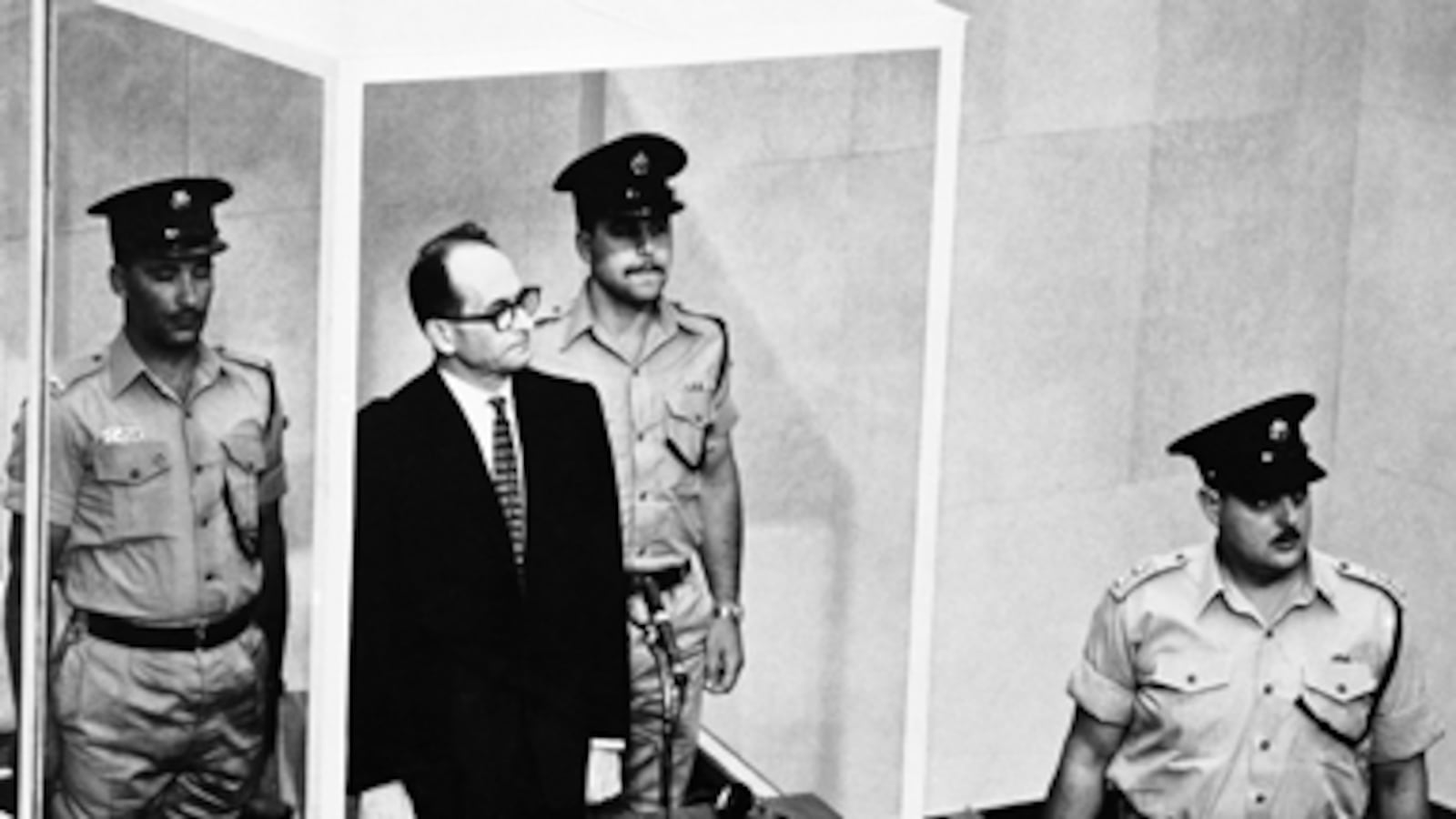On April 11, 1961 scores of reporters from throughout the world—far more than had been present at the Nuremberg tribunals 15 years earlier—gathered in Jerusalem. They were there for the beginning of the trial of Adolf Eichmann, a legal process that changed not just how the world thinks about genocide, but how it sees the victims of this horrific crime. More than an historical artifact, the trial continues to reverberate into our own age; the journalists in the courtroom, as much as the Nazi in the dock and the survivors on the witness stand, were part of the story.

On that spring day in Jerusalem, the excitement of the journalists was palpable. This trial, they predicted, would be different from all the war crimes tribunals which had preceded it. Precisely 11 months earlier, Israeli Prime Minister David Ben Gurion had set off a media maelstrom when he strode into the Knesset and, with no warning, announced that Adolf Eichmann, the man he considered the architect of the Final Solution, was in Israel’s hands and would be tried in an Israeli court.
The high drama of Eichmann’s kidnapping on the streets of Buenos Aires by Israeli agents was thrilling enough, but what Ben-Gurion understood, and what the journalists were there to cover, was a trial conceived as compelling theater.
As the number of witnesses to the Holocaust is rapidly diminishing, it is fitting to remember the moment when they—and by extension all other victims of genocide—first gained, not a voice, but a hearing.
This would be the first time since the destruction of the Second Temple in Jerusalem in 70 A.D. that Jews would sit in judgment of a non-Jew who had done them wrong. The existence of a Jewish state, a place where there were more Holocaust survivors than anywhere else, made this possible, but the existence of television sets in millions of homes made it part of mass culture.

This was the first time a trial was broadcast internationally. ABC, CBS, and NBC were miffed when Israel gave the rights to a small unknown company called Capital Cities, which eventually became the parent company of ABC. (Israel stipulated that Capital Cities had to share the footage with other media outlets.) The networks offered both specials and regular reports on the trial. Americans could watch the previous day’s proceedings over dinner. And they did. So too did viewers in close to forty other countries. (One country where the broadcasts were unavailable was Israel, which did not offer broadcasting services until 1966.) I suspect that watching snippets of the trial on television as a child helped push me toward my present career.
It’s unsurprising that the trial crops up in the first season of Mad Men—a Jewish character, feeling the sting of discrimination in postwar Manhattan, has already made a touchstone of his capture and impending trial, learned via television in her living room.
With the Eichmann trial, the medium and the method were perfectly joined. At Nuremberg, the crime of genocide was a sidebar, an example of one of the many crimes against humanity the Third Reich had committed. Moreover, that proceeding was built, almost entirely, on documents. Witnesses, the prosecution assumed, could not be trusted to tell their story in a fashion that would convince the judges. In contrast, the Eichmann trial was the first war crimes trial to rely heavily on victims’ testimony. Israel’s Attorney General, Gideon Hausner, intent on painting a complete tableau of this crime, one that would convey its emotional impact, actively sought out survivors with a “good story to tell.” Day after day survivors entered the witness box and spoke in the first person singular. Never before had the world heard the victims—men and women in their 40s—describe in such detail what had been done to them. Though scores of documents were submitted, it was the victims’ stories that captivated the audience. Ironically, the judges were among the few observers who responded otherwise. They noted that while the testimony of Holocaust survivors “who poured out their hearts as they stood in the witness box” would be useful to historians, for them it was just “a by-product of the trial.” Instead, they based their judgment on the documents. This was a valid jurisprudential decision. Robert Servatius, Eichmann’s defense attorney, well aware that he was in a courtroom filled with survivors, had been reluctant to vigorously grill the survivors in order to expose any possible inconsistencies or inaccuracies in their statements. At subsequent war crimes trials the victims have generally had a far more confrontational courtroom experience.
Ben-Gurion had grasped the mytho-poetic essence of the moment back when he had announced that Eichmann was the architect of the Nazi genocide. In fact, Eichmann was not the architect of the murder program. He was, however, one of its main managers and was responsible for rounding up well over a million people and sending them to their death. He relentlessly pursued any Jew who eluded his grasp. He ingeniously accomplished his herculean task with the help of a small staff of men who shared his commitment to the cause. Though he did not conceive of or plan the genocide, he was far more than its bureaucratic manager as one of the trial’s reporters, Hannah Arendt, who covered the trial for The New Yorker, would suggest.
For Ben-Gurion, the trial was to be both historical and meta-historical. Modern history, religious significance, and compelling drama were woven together into something that transcended the limits of ordinary jurisprudence. Here was a passion play with Jews as the victims, Jews as the prosecutors, Jews as witnesses, and Jews as judges. Since Jews would serve in all these roles (not to mention as guards) many critics wondered if the proceedings were inherently unfair. How, they asked, could victims sit in unbiased judgment? Arendt, who criticized much about the trial, branded that charge “unfounded” and asked why the partiality of Jewish judges was being questioned when that of Polish or Czech judges who had presided over war crimes trials in their countries had not been.
It was in part to counter this criticism that Israel had arranged to have the trial televised.
The confluence of Hausner’s reliance on victims’ testimony and the televising of the proceedings gave the victims of the Holocaust an unprecedented opportunity. While the Eichmann trial was not the first time survivors spoke out in public, it was the first time that they were heard by the world in this way. Virtually every subsequent war crimes trial where victims have had “pride of place” is modeling itself on these proceedings. When a judge at the International Criminal Tribunal for the former Yugoslavia told a witness “you have a right to be heard,” he was echoing what had begun in Jerusalem 50 years ago. Claude Lanzmann’s objective for his magnum opus, Shoah, was to enable viewers to see on screen what the public heard at the trial: the facts in their most minute detail given by those who had experienced them. The Eichmann trial endowed the victims of genocide with unprecedented verbal clout, what literary theorist and Emory Professor Shoshana Felman describes as “semantic authority.”
During a conference at Yad Vashem a number of years ago I met with some young Rwandans, all of whom had seen their families massacred. They had come to Jerusalem to learn how to take testimony from genocide victims. While in Jerusalem they bonded with a group of French speaking elderly Holocaust survivors. The Rwandans declared their goal was to be “just like those Jewish survivors.” One explained that he wanted: “to tell my story so that those who were not there will listen and remember.” I have heard the same sentiment expressed so often by Holocaust survivors. Today, as the number of witnesses to the Holocaust is rapidly diminishing, it is fitting to remember the moment when they—and by extension all other victims of genocide—first gained, not a voice, but a hearing.
Deborah E. Lipstadt is Dorot Professor of Modern Jewish History and Holocaust Studies at Emory University. She is the author of History on Trial: My Day in Court with David Irving (a National Jewish Book Award winner); Denying the Holocaust: The Growing Assault on Truth and Memory; and Beyond Belief: The American Press and the Coming of the Holocaust, 1933–1945. She lives in Atlanta.





